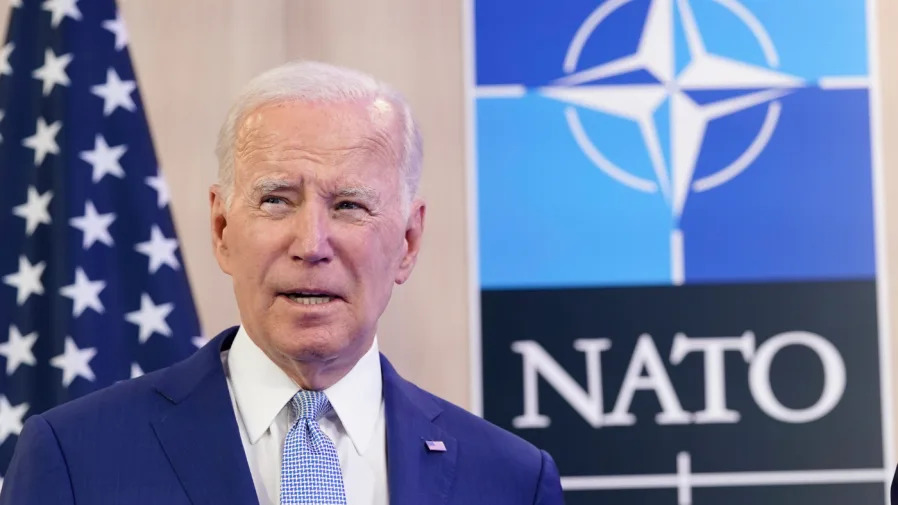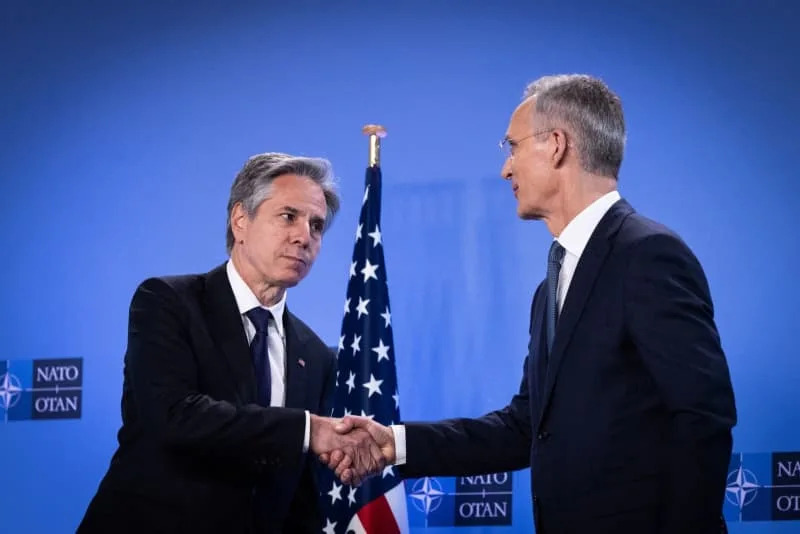It is still several months before the US presidential elections, but it is already evident that Donald Trump has achieved the remarkable feat of saving Nato from itself.
For all the fanfare that will accompany the celebrations to mark the 75th anniversary of the alliance’s formation, which falls today, serious doubts have been raised about Nato’s ability to continue fulfilling its fundamental obligation, namely to keep the peace in Europe.
While the alliance has demonstrated commendable resolve in maintaining its support for Ukraine after Russia’s unprovoked invasion in February 2022, the willingness of member states – especially in Europe – to make adequate provision for their own defence has generated much controversy.
This is especially true in the US, which has made the largest military contribution to Nato since the alliance’s inception in Washington on 4 April 1949, and has become increasingly frustrated at the reluctance of many European powers to pay their fair share.
It is a concern that Trump used to berate European leaders, especially the then German chancellor Angela Merkel, during his first term in office. His constant hectoring that Europe should do more to meet its Nato spending commitments has even led some Nato leaders to fear that Washington could withdraw from the alliance altogether if the former president succeeds in his re-election bid in November.
Concerns about Washington’s commitment to Nato were not helped by Trump’s provocative remark, made at an election rally in February, that he would “encourage” Russia to attack any member that he considered was failing to meet its obligations. Trump later tried to reassure America’s allies in a recent interview with Nigel Farage on GB News, declaring that the US would maintain its Nato membership “100 per cent” if he wins a second term – but only so long as the Europeans “treat America fairly”.
Before a vote has even been cast in the US elections, Trump’s constant demand that all Nato member states must meet the minimum requirement of spending 2 per cent of GDP on defence seems to have had a salutary effect on the chancelleries of Europe. Ten years ago, just three Nato countries reached the 2 per cent mark; that number is now expected to rise to 18 by the time alliance leaders convene in Washington in July. The remaining 14 countries of the 32-strong organisation – including Canada, Italy and Spain – will face strong pressure to toe the line.
At a moment when the security of Europe is facing its gravest threat since the end of the Cold War due to Russian president Vladimir Putin’s revanchist ambitions, it says much about the poor leadership qualities of today’s generation of European politicians that it may well have been the prospect of Trump’s re-election that forced them to act.
Nato’s ability to emerge victorious from the Cold War, with the collapse of the Iron Curtain in 1989, owed much to the willingness of politicians on both sides of the Atlantic to sustain adequate defence spending, which routinely averaged more than 3 per cent of GDP.
There are already encouraging signs that at least some European states acknowledge the importance of investing more in defence, with those, like Poland, that find themselves directly in Putin’s crosshairs, raising spending above 3 per cent. Meanwhile, both Sweden and Finland, the alliance’s latest recruits, have shown their commitment to their new allies by authorising significant increases in military expenditure well beyond the 2 per cent threshold.
Another positive sign that the Europeans are finally acknowledging the need to do more to safeguard their own security is the latest proposal to make their own funding arrangements for Ukraine’s war effort.
The idea of setting up a dedicated Nato “trust fund” is designed to enable European Nato members to continue supporting Kyiv even if Trump wins re-election. Trump and his allies have been critical of what they see as the Biden administration’s “blank cheque” approach to backing the Ukrainians. As Nato secretary-general Jens Stoltenberg remarked with masterful understatement, the creation of such a funding structure for Nato would “shield it against the winds of political change”.
Irrespective of whether Trump’s re-election really would adversely affect support for Kyiv, the mere fact that European leaders might consider alternative options is undoubtedly a step in the right direction. The Ukraine conflict is, after all, a European war, one that potentially has far more serious implications for the future security of Europe than it does for the United States.
And it is certainly a great improvement on the long-standing obsession of some European leaders, particularly in Germany and France, with creating a European Defence Force that could act independently of Nato.
The establishment of such an EU-led body would not only be no match for Russia’s vastly superior military firepower. It would completely undermine the fundamental pillars of transatlantic cooperation that have proved so successful in maintaining the peace in Europe for 75 years.
Biden praises NATO on alliance anniversary amid Trump threats
President Biden praised the NATO alliance to mark its 75th anniversary Thursday, amid threats from former President Trump to encourage aggression toward “delinquent” members.
Biden called NATO “the greatest military alliance in the history of the world,” adding that for the last 75 years, the “United States and our fellow Allies have chosen to come together to stand up for freedom and push back against aggression.”
The president outlined that the alliance stood united during the Cold War, invoked Article 5, which declares that an attack on one ally is an attack on all, after the Sept. 11, 2001, attacks, and has stood united during Russia’s war against Ukraine.
He also touted Finland and Sweden recently becoming members and argued that now, “NATO is larger, stronger, and more determined than ever before.”
At a February rally, Trump told a story of an unidentified foreign leader questioning his threat not to defend members who do not hit the alliance’s defense spending targets. He said he told them he would “encourage” Russia to do whatever it wishes and recounted saying, “You didn’t pay? You’re delinquent.”
Biden hit Trump for those remarks at the time, saying “everything is transactional” for his 2024 GOP rival.
“Now, like generations before us, we must choose to protect this progress and build on it,” Biden said in the statement Thursday.
“We must remember that the sacred commitment we make to our Allies — to defend every inch of NATO territory — makes us safer too, and gives the United States a bulwark of security unrivaled by any other nation in the world,” the president continued. “And like our predecessors, we must ask ourselves what can we do — what must we do — to create a more peaceful future.”
NATO secretary general: Europe needs US and US needs Europe
US Secretary of State Antony Blinken (L) shakes hands with NATO Secretary General Jens Stoltenberg during a meeting on the sidelines of the NATO foreign ministers meeting in Brussels. Europe and the United States need one another for their own security, Stoltenberg said in a speech to mark the alliance's 75th anniversary on 04 April.
Europe and the United States need one another for their own security, NATO Secretary General Jens Stoltenberg said in a speech to mark the alliance's 75th anniversary on Thursday.
"Europe needs America for its security," Stoltenberg said. "At the same time, North America also needs Europe. European allies provide world-class militaries, vast intelligence networks, and unique diplomatic leverage, multiplying America's might."
Acknowledging long-standing US concerns that European allies aren't contributing enough to collective defence, Stoltenberg said: "Fair burden sharing is essential, and Europe is investing more, much more. This year, the majority of NATO allies will invest at least 2% of their GDP [Gross Domestic Product] in defence."
"Through NATO, the United States has more friends and more allies than any other major power. I don't believe in America alone, just as I don't believe in Europe alone," he added.




